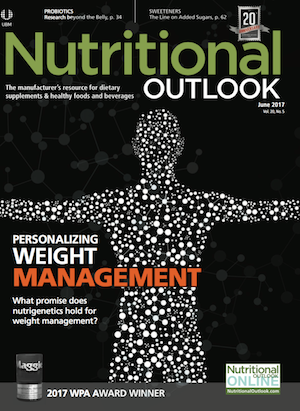How Capsules Solve Delivery Challenges of Today’s Most Popular Weight-Management Ingredients
Capsules can improve the stability, bioavailability, and taste-masking of some of the most popular weight-management ingredients.
Photo © Shutterstock.com/Fabio Berti

By Missy Lowery, Senior Manager of Marketing, and Justin Southern, Formulations Scientist, Capsugel (Morristown, NJ)
Weight management remains a key category of the U.S. dietary supplement market. Recent data from Nutrition Business Journal indicate that weight-management supplements are still among the top 10 of top-100-selling dietary supplements in the United States. As the demand for weight-management products rises alongside a growing obese and overweight population, manufacturers would be wise to understand that product-delivery formats can appeal to consumers as much as the weight-management ingredients themselves. The ease of use and appeal of a dosage form not only influences whether a consumer will regularly use a product; it also greatly affects a supplement’s efficacy and outcomes.
Of the 78 new weight-management supplements Mintel reported launching globally between January 2015 and May 2016, 46% were formulated in capsules. Brand companies are relying on capsules as their delivery form because they are a simple and clean-label approach to supplement delivery. The consumer mega-trends of transparency and authenticity are influencing buying in this category. Claims on some of the major new products speak to naturally nutrient-rich ingredients, non-GMO verification, and minimal processing-all promises that capsules can help products make thanks to innovation and technological advancements.
In addition to providing vegetarian and non-GMO consumer choices, hard-capsule technologies can also help manufacturers meet delivery challenges of stability, bioavailability, and taste-masking presented by some of the most popular weight-management ingredients. Ahead, we look at some of the delivery-system dilemmas implicit in weight-management formulating today and how hard capsules provide solutions.
Resveratrol (Red Wine Extract)
Resveratrol is a molecule found in the skin of red grapes and in red wine. Researchers have been investigating resveratrol’s potential effect on weight management and its ability to enhance exercise endurance. The resveratrol molecule, however, is prone to degradation if exposed to oxygen, heat, or light, all of which can compromise the supplement’s stability over time.
But stability can be achieved when the extract liquid is encapsulated in a hard gelatin capsule that is flushed with nitrogen before it is fused shut with a hermetic seal in order to reduce oxidative action. The capsule’s opaque shell can also protect the contents from light. Furthermore, because resveratrol has a bitter taste, consuming it via a hard capsule that opens after ingestion eliminates the unpleasant taste if resveratrol is swallowed in straight liquid form.
L-arginine
A building block of protein, L-arginine is a precursor of nitric oxide, which causes blood vessels to relax for a positive cardiovascular effect. L-arginine is thought to stimulate protein synthesis when combined with weightlifting and a hyper-caloric diet, and might promote weight management by reducing body fat and increasing lean mass.
L-arginine can be micronized (broken down into extremely small particles)-as well as solubilized-in a free-flowing liquid with a high concentration of active ingredient so that the active is more easily absorbed. Encapsulating this liquid formulation in a hard-shell capsule in a nitrogen-flushed environment and then hermetically sealing it has been shown to maintain stability of this product compared to other forms of L-arginine.
HMB (β-hydroxy β-methylbutyric Acid)
A naturally occurring metabolite of leucine in the body, HMB has been shown to increase the synthesis of proteins in skeletal muscle and reduce muscle damage and breakdown post-exercise, helping to support regular exercise and muscle health. HMB in a calcium salt form or a free-acid (FA) form is often formulated into a liquid for drinking.
For greater convenience and bioavailability, however, the HMB-FA form can be encapsulated at a much higher dosage level than the HMB salt form. A dose of up to 500 mg in a colorless, readily absorbable liquid can be stabilized for long-term integrity-even despite the ingredient’s acidic nature-in a hard-shell capsule made of a low-moisture hydroxypropyl methylcellulose (HPMC) vegetarian polymer.
White Kidney Bean Extract
Used in weight management as a carbohydrate blocker, this extract has been studied for its ability to inhibit the action of the body’s amylase enzyme, which otherwise breaks starches into sugars for absorption in the body. Supplement manufacturers can maintain vegetarian claims by encapsulating this natural extract of white kidney bean in a HPMC hard capsule as a powder fill or liquid fill.
Creatine
Creatine is a compound naturally synthesized within humans and stored in muscle tissue. Creatine restores adenosine triphosphate (ATP), the energy source that the body uses at rest and especially during strenuous exercise. Creatine supplementation has been used to increase the body’s concentration of creatine, with increased creatine consumption linked to the increase of lean body mass over time.
Creatine is highly bioavailable after ingestion, but because a portion of the compound is extremely prone to degradation by stomach acids and enzymes, delayed delivery closer or within the intestines is preferred. An optimized delivery solution is an acid-resistant hard capsule that delays the onset of opening until 52 minutes after ingestion as the capsule is about to leave the stomach.
Combination of CLA (Conjugated Linoleic Acid) and L-carnitine
Conjugated linoleic acid (CLA), usually derived from safflower oil, has been studied as an aid in fat loss for the obese and has been shown in vitro to inhibit the transformation of nonfat food materials into fat. L-carnitine, in the meantime, is a naturally occurring amino acid–like nutrient essential for fat metabolism and energy production. In combination, it is thought that these ingredients can promote energy production in those deficient in L-carnitine, including the aging population, while supporting fat loss through the actions of CLA.
Because CLA is an oil and L-carnitine is a water-soluble powder, the two ingredients will not mix, resulting in an insoluble slurry as well as an unattractive fill. They can, however, be combined in a convenient, single dose in a capsule-within-a-capsule application. The outer capsule filled with safflower oil with a high CLA concentration dissolves first, followed shortly by dissolution of the inner, low-moisture HPMC vegetarian capsule used to protect the integrity of the hygroscopic L-carnitine fill.
BCAA
Protein, when digested, is broken down into amino acids that the body then absorbs, thus contributing to the anabolic process of muscle building, which is relevant to active exercisers for building muscle mass and for mitigating muscle loss during the aging process. The branched-chain amino acids leucine, isoleucine, and valine are essential amino acids that the body cannot synthesize and that many consumers ingest by way of supplementation.
Manufacturers typically flavor BCAA powders to mask their less-than-desirable taste. An alternative delivery form is lipid multiparticulate (LMP) technology that incorporates the BCAA in a spherical lipid that effectively masks the taste because it dissolves after ingestion, not in the mouth. These LMP microspheres can then be included in a powdered blend in capsules and be included in “sprinkle” capsules designed to be opened up by the consumer, with ingredients then sprinkled onto food such as yogurt.
Use It to Lose It
Capsules deliver a host of benefits for the weight-management category: convenience, easy consumption, ingredient enhancement, and clean-label values. Don’t forget that in the eyes of consumers, dosage forms can be just as important as the ingredients themselves.
Missy Lowery is senior manager of marketing for Capsugel (Morristown, NJ). Justin Southern is a formulations scientist at Capsugel. Capsugel is a global leader in delivering high-quality, innovative dosage forms and solutions to healthcare companies around the world.

Prinova acquires Aplinova to further increase its footprint in Latin America
April 7th 2025Prinova has recently announced the acquisition of Brazilian ingredients distributor Aplinova, which is a provider of specialty ingredients for a range of market segments that include food, beverage, supplements, and personal care.


















